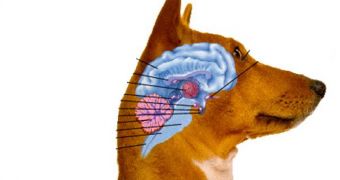Dogs are fairly intelligent, they learn rapidly and it is not too difficult to train them, but a new Austrian research published online in Animal Cognition has really come up with a surprise: dogs seem to be able to form abstract concepts. We do not dare to attribute this even to apes, but the team led by Friederike Range from the University of Vienna in Austria has revealed for the first time that dogs can assign complex color images into categories exactly the way we do.
The pooches proved it by using computer automated touch-screens, so that the potential human factors were totally removed. To check if dogs can visually classify images and apply this to new situations, 4 dogs were presented landscape and dog pictures. During the training phase, the animals saw both the landscape and dog images simultaneously and received a food pellet each time they chose the dog image (positive stimulus in conditioned learning).
After the training period, the dogs were presented totally new dog and landscape images. The animals kept on selecting the dog photographs, thus applying what they learned during the training to totally new situations (stimuli), never experimented (seen) before.
In another trial, the dogs were presented new dog images placed onto the landscape pictures employed during training, mixing contradictory data: the dog images were new positive stimuli, while the negative stimulus, the landscape, was familiar. When the pooches had to choose, they went to the dog option. It appears that the animals could get an abstract concept (in this case "dog"), even if we cannot tell if they actually recognized the dogs in the dog images.
"Using touch-screen computers with dogs opens up a whole world of possibilities on how to test the cognitive abilities of dogs by basically completely controlling any influence from the owner or experimenter. The method can also be used to test a range of learning strategies and has the potential to allow researchers to compare the cognitive abilities of different species using a single method," wrote the authors.

 14 DAY TRIAL //
14 DAY TRIAL //